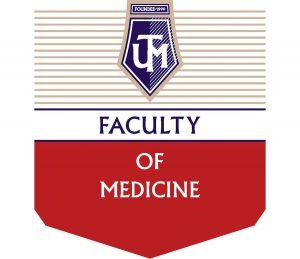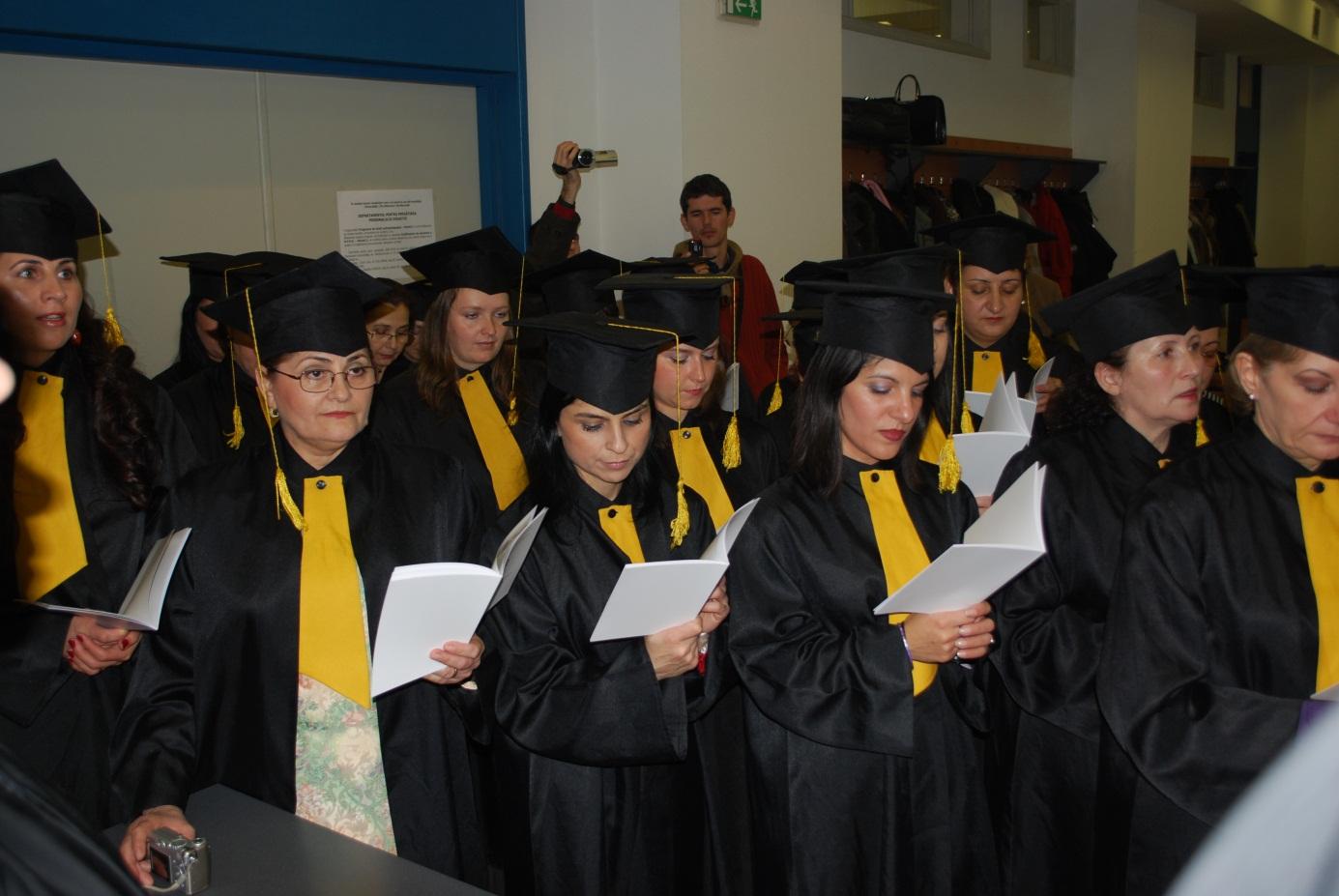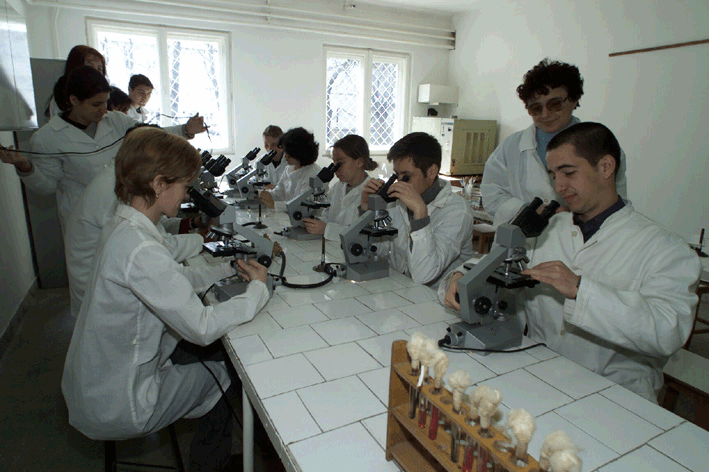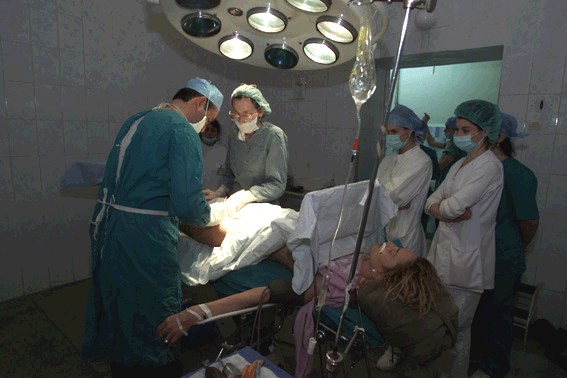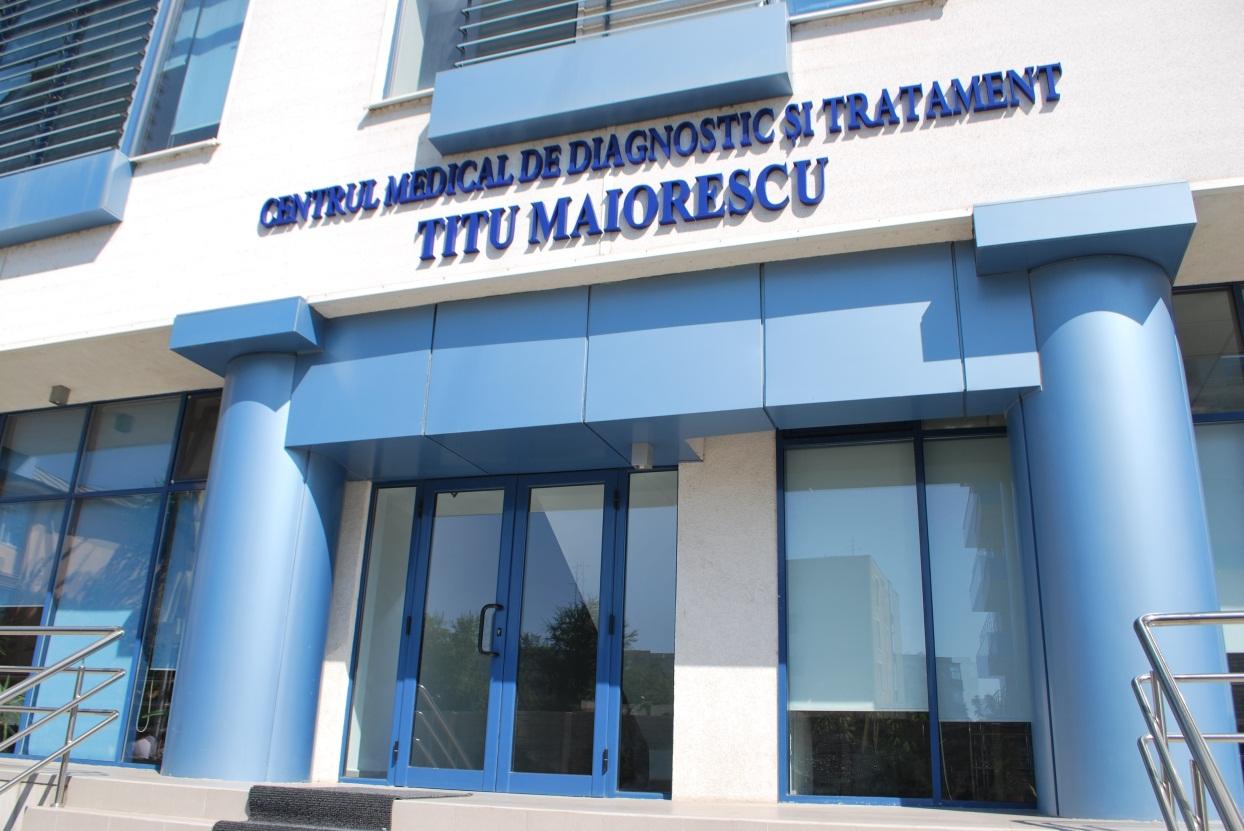About Us
Established higher education institution, with outstanding results in the specific field of activity, Faculty of Medicine of “Titu Maiorescu” University of Bucharest, according to a long tradition, but as rich as possible, the main mission is the training of highly qualified staff in the medical field and in other interdisciplinary fields, constantly manifesting itself in the avant-garde of the scientific research in Bucharest and in our country.
The Faculty of Medicine of “Titu Maiorescu” University operates on the principles of modern education, which generates competition and performance in the national and European academic space.
The faculty is internationally accredited at: FAIMER – Foundation for Advancement of International Medical Education and Research – and WHO – World Health Organization.
Since 2003, the Faculty has been enrolled in the Faculty of Medicine Yearbook, published in Philadelphia, USA, alongside other prestigious medical faculties in Romania.
HISTORY – the creation and evolution of the Faculty of Medicine
The Faculty of Medicine, which operates at the University in 1990, was accredited by H.G. no. 944 published in the Official Gazette no. 675 of September 11, 2002, for the general medicine specialty, with a duration of 6 years, with 360 transferable credits, the form of full time education.
Initially, the Faculty of Medicine of Titu Maiorescu University had two distinct specializations: General Medicine and Dentistry.
From the 1993-1994 academic year, the specialization in dentistry became a standalone faculty, obtaining the name of the Faculty of Dentistry.
In 2005, the establishment and authorization of the second specialization of the Faculty of Medicine was approved and approved, namely the Medical Assistance, in relation to the provisions of the Law 88/1993 and the GD no. 88 of February 10, 2005, by CNEAA address no.2207 dated 03.11.2005, sector regulated by the European Community, for day education.
In 2009, the TMU Senate decided, for managerial reasons, the reorganization of medical education within TMU by unifying the Faculty of Medicine with the Faculty of Dentistry, under the name of the Faculty of Medicine and Dentistry, with 4 specializations: medicine, dental medicine, General Medical and Dental Technology, which was approved by GD 749, published in OJ no. 465 of 6 July 2009.
Since 2011, the two medical faculties have separated into two academic structures, the Faculty of Medicine and the Faculty of Dental Medicine respectively.
In 2015, the Faculty of Medicine received from ARACIS the maximum rating, the degree of “trust”. Obtaining this accreditation is a great achievement, but also a real test of the entire academic community in our faculty.
The Faculty of Medicine has its own staff that corresponds, from the point of view of the professional qualification, to the conditions required for the occupation of the provided positions.
The structure of the Faculty of Medicine’s management during the 25 years was the following:
Deans: Prof. PhD Zaharia Corneliu, Prof. PhD Ludovic Paun, Prof. PhD Dan Ungureanu, Associate Professor Minerva Ghinescu and Professor PhD Cristian Adrian Stan PhD.
Prodecani: Prof. PhD Andrei Voinea, Prof. PhD Andrei Firica, Prof. Dan Ungureanu, Prof. PhD Florina Opriş, Prof. Univ. Petru Armean, Associate Professor Bădulescu Adriana, Associate Professor Tanasi Mihai, Associate Professor Tudor Hârşovescu, Associate Professor Minerva Ghinescu, and Associate Professor Gabriel Cristian.
SCIENTIFIC RESEARCH
The students of both specialties of the Faculty of Medicine are framed in the student scientific circles of the clinical and preclinical disciplines, being oriented towards subjects related to the faculty profile. The Faculty of Medicine elaborates its own research plans, which are of interest both to teachers and students. This activity is completed by presenting scientific papers at the Joint Scientific Session of Teachers and Students, which takes place annually in our faculty at the end of May.
This activity is integrated into the scientific research plan elaborated at the level of each department and adapts annually according to the research results. Annually, in principle, at the end of May, the Scientific Session of Teachers and Students of the Faculty of Medicine, both the specializations, are published. The most successful works are published in the journal Titu Maiorescu’s Annals, Medicine series and in the volume of abstracts Of the session.
Starting with the academic year 2006-2007, within the Faculty of Medicine the scientific research activity was coordinated by the Scientific Council of the Faculty of Medicine with the following composition: Professor Andrei Firică – President and the following members: Prof. Dan Ungureanu, Professor Petru Armean, Professor Olga Dorobat, Professor Florina Opris, Prof. Constantin Dumitru Tudor Aurica Lecturer, Associate Professor Adriana Badulescu Anca Pavel Associate, Assistant Professor Dr. Stefan Bedereag, PhD researcher, PhD Viorel Alexandrescu researcher Dr. Iudith Ipate.
The research projects and themes in the strategic plan were finalized in these academic years by submitting 6 grants to the CNCSIS programs and a grant to the IMPACT programs.
The results of the scientific research of the teaching staff are capitalized by participation in congresses, symposia or national and international conferences, articles publications in specialized journals, monographs or treatises.
The research projects were initially funded from the resources of the coordinated disciplines, and they are expected to attract external funding sources (research centers, grants, international collaborations) for the proposed themes, similarly to the other faculties of the university.
The scientific research activity of the Faculty of Medicine is coordinated by a Scientific Research Council and is carried out through the Scientific Research Centers under the executive direction of the “Academician Nicolae Cajal” Medical Research Institute of Titu Maiorescu University through:
a) Integrated Medicine Research Center;
b) Research Center for Biomedical Sciences;
c) Center for Research in Laparoscopic Surgery.
The scientific research carried out by the students from the specialties of Medicine is carried out mainly within the Scientific Circles organized by the departments of the faculty and is realized through the organization of own student scientific manifestations, as well as works in which the students are authors together with the coordinating teachers.
Research projects in the activity of Short and Medium-term Centers (3 years) are: development of studies and applicative researches on oncological genomics, modern prosthetic materials manufacturing technologies and assessment of their resistance to biomechanical stress, accident and safety Medical and malpractice trauma, cranio-cerebral traumatology and polytrauma, applied medical and bioethical ethics, medical and patient rights, telemedicine, modern medical diagnosis and treatment in cardiology, liver transplantation, laparoscopic and bariatric surgery, infantile neuropsychiatry, diabetology, neo Advanced therapy and premature therapy, disaster medicine, proteomics and genomics, etc.
Starting with November 2007, Titu Maiorescu University in Bucharest organized the first International Conference entitled “Education and Creativity for a Knowledge Based Society”, which brought together a significant number of teachers from other faculties or universities in the country And from abroad. The conference was also held on sections, including Medicine, reaching this year’s eighth edition.
The Faculty of Medicine has partnerships with the Medical Connections Magazine, the Romanian Journal of Dentistry, the Romanian Journal of Criminology, the Modern Medicine Magazine and the ORL.RO Magazine edited by the Bucharest College of Physicians who are B + rated and are indexed to the BDIs and have the Scientific Councils Faculty of Medicine of TMU
INTERNATIONAL RELATIONS
Within the Erasmus and Socrates programs, the Titu Maiorescu University Faculty of Medicine has collaborated with Lyon School of Medicine, then with the Faculty of Medicine in Paris, A Coruna University, Sapient University of Rome and the Faculty of Medicine in Innsbruck, following that in the future it will also start to collaborate with other prestigious universities in the European space. This program provides mobility for both students and teachers for different periods of one or two semesters.
In this respect, aiming at the internationalization of medical education in our university, the leadership of the Faculty of Medicine has ensured over the years the achievement of the following main objectives, necessary for an efficient international collaboration:
- Ensuring Longlife Learning Program’s institutional management and coordinating all international activities,
- Student and teacher mobility,
- (Such as the programs with Innsbruck, Paris, Vienna, Sapient, AKH Vienna, Tel Aviv, A Coruna and Bergamo), the organization and monitoring of education programs and relations with health education institutions in the European Community,
- Collaboration with the National Agency for Combarelles Program in the Field of Vocational Education and Training (ANPCDEFP).
In addition to the funds necessary for the development of its activity, the Faculty of Medicine also uses funds from external sources (through community programs – ERASMUS), with the help of which is the broadening of the international relations with universities in the European Union and by the mobility carried out by Teachers and students, the qualitative increase in the education and research process is achieved.
The Faculty of Medicine has research partnerships in the Erasmus + program with: Technische Universität Dresden (Germany), “La Sapienza” Universita degli Studi di Roma and partnerships for internships with: Policlinico di Monza (Italy) and Mediclin (Germany).
He was awarded the title of Doctor Honoris Causa, Prof. Dr. Christoph Zielinski (Austria), personality of world oncology.
FACULTY OF MEDICINE IN NUMBERS
During the 25 years of operation they were trained at the Faculty of Medicine of Titu Maiorescu University. 1581 students obtained the Bachelor’s degree and 19 students obtained the master’s degree. Graduates of our faculty have been licensed since 1998 at the University of Medicine and Pharmacy “Carol Davila” in Bucharest. They passed the 88% exam. Since 2003, the Bachelor’s degree examination is held at the Faculty of Medicine of Titu Maiorescu University, where the graduation was over 95%, and from 2008, the bachelor’s examination in the specialty of General Medical Assistance was also supported in our faculty.
A proportion of graduates, between 17% and 70%, have been admitted to the country and abroad (European Community and the United States of America) over the years, and most of the faculty assistants of the Faculty of Medicine are graduates of our faculty.
The Management of the Faculty of Medicine is constantly concerned with the practical training of the students, in this sense, a POSDRU project was gained for the students’ specialty practice and the improvement of their insertion into the labor market.
One of the performance indicators is also the fact that of the over 1500 graduates, most of them are employed on the labor market in the country or abroad, with a legal employment contract, corresponding to the post graduation diploma.
The bachelor’s examination at the Faculty of Medicine is organized in two sessions, in July and September, according to the Methodology of conducting the bachelor’s examination within our faculty and it has a national character, being organized jointly and in collaboration with all faculties of medicine. Bachelor’s degrees are issued by the “Titu Maiorescu” University, Faculty of Medicine.
In the last three years (2011-2013), the percentage of graduation on the license exam was between 98.61% and 100%.
We estimate that approximately 95% of graduates of the Medicines Program have committed within one year of graduation, with available statistical data showing that between 60% and 70% of the graduates of the last three years (2011-2013) passed the residency exam both in Romania and other EU countries. Also some of the graduates take up positions in public or private medical institutions or pursue other careers based on the medical license (drug companies, specialized abroad, insurance, etc.).
Many young teachers, assistants and heads of papers of the Faculty of Medicine come from the ranks of our graduates, numbering 18 teachers per 90 teaching staff. From the data we have up to now, about 70 graduates of the Faculty of Medicine, TMU, have enrolled in the PhD. or Masters degree.
EDUCATIONAL PROCESS
The educational structure of our faculty consistently reflects the postulates of the Bologna Declaration, including the three mandatory cycles provided by the National Education Law, undergraduate, masters and postgraduate studies of specialization, master and doctorate (under accreditation) as well as lifelong learning programs rewarded with transferable credits and covered by physicians with a scientific degree.
The curricula and disciplinary programs have been elaborated on the basis of a modern concept, in an interdisciplinary perspective, in accordance with the international standards of higher education in general and the medical one in particular, with the finalization of the formation of future specialists with a solid training specialty and general culture that puts them in an advantageous position in the competition for career success.
More than a simple transfer of knowledge from the teacher to the student creates learning environments and experiences that lead students to discover and create knowledge themselves.
Study subjects have, in addition to training skills and skills to counsel and facilitate learning processes. In the Faculty of Medicine there is ongoing activity of identifying, developing and implementing new effective learning techniques. The study program of Medicine has integrated practical training stages, while involving students in research and development projects.
Traditional methods of transmitting information only (through an advisor or course) have proven inadequate over time, so that for facilitating and streamlining the teaching process, special attention has been given to informing students about the means of teaching, learning and evaluating knowledge.
The teaching and learning procedures have been continually focused on interactive learning, dialogue with students, the importance of the formative side in didactic activity (room questions, brief presentations, or demonstration experiments). This component, together with the informative one, stimulates creative learning and contributes to the continuous improvement of students’ knowledge, skills and competences.
Teachers provide consultations and personalize guidance at the student’s request.
There is a tuition regulation in the Faculty of Medicine, there are tutors for each year of study that provides consultations on a weekly schedule.
Guidance is also done through extracurricular activities, such as the student’s academic circles organized by the two departments that offer the image of the skills, the particular skills of a student, and which justify encouraging it in a particular field of activity or function.
Teachers set up a weekly program of direct and e-mail consultation, giving students the opportunity to find answers to various specialist issues that are relevant to the field of teacher guidance and beyond.
Thus, teachers knowing their skills and level of training can personalize the teacher-student relationship by guiding the student in choosing future specialization and targeting a particular job.
The meeting with graduates and future candidates in the Open Gates event gives students the chance to have a direct dialogue with graduates who have recently become medical practitioners and provides the most eloquent sample of professional guidance through the example of our graduates’ – there is collegiate tuition between students between the years and other students and between graduates and students.
In this context, based on the permanent assessment of education as a system and process, the Faculty of Medicine is concerned with the adaptation of its educational and research programs to the advances in science, technology and culture, the needs of the Romanian society, as well as their compatibility with Programs of other universities and academic and professional bodies in the country or abroad.
Currently, the first medical education specialization, accredited by H.G. no. 944 published in the Official Gazette no. 67, the form of day education, operates with a 6-year study period, 360 transferable credits, with over 5800 hours of theoretical and practical training completed by a bachelor’s examination.
The second accredited General Medical Care specialty works according to H.G. 676/2007, a 4-year study program, 240 transferable credits with at least 4600 hours of theoretical and practical training completed by a bachelor’s degree examination.
Postgraduate courses organized by the Faculty of Medicine are carried out according to an annual plan, with the following thematic structure: Postgraduate course in functional medicine in collaboration with Italian specialists, Postgraduate course of laparoscopic surgery, postgraduate course of home care assistant, Postgraduate course of resuscitation New post-graduate course on the treatment of neo-natal asphyxia, postgraduate course of medical malpractice, postgraduate course of integrative medicine, international postgraduate course in oxygen-ozonotherapy, postgraduate course “prevention and response of civil society to bioterrorist attack”.
At present, the collaboration with the hospitals has been extended to more than 20 hospital units, based on collaboration contracts, including: “Carol Davila” Central Military Emergency Hospital, CF 1 Witting Hospital, Fundeni Clinical Institute , CF Clinical Hospital 2, Ilfov County Clinical Hospital, “N.Malaxa” Clinical Hospital, Colentina Clinical Hospital, “Victor Babeş” Clinical Hospital, Acad. Cardiovascular Disease Center “Acad. Vasile Cândea “.
Collaboration with the Private Health Network REGINA MARIA started with a partnership contract, materialized by putting into operation the Diagnostic and Treatment Center Titu Maiorescu, based in Body M, on the ground floor, of our university. Thus, the foundations of the medical collaboration of the teachers who will carry out consultations in the center’s offices and the provision of free medical services, to the teachers and to the students of our university were laid.
In this context, mention is also made of the facility offered to all TMU students at the FT form of education, providing free medical assistance on the REGINA MARIA Network.
STUDENT SERVICES
For the best students in Medicine, scholarships for excellence and merit scholarships are granted, the scholarship system with transparent, non-discriminatory, carefully monitored criteria, mechanisms and procedures.
“Titu Maiorescu” University has social, cultural and sports services for students such as: accommodation, sports facilities, various counseling services, which have an efficient administration. Also, TMU offers various services to students and has special programs to ensure a quality student life, which they monitor and evaluate periodically.
The university also provides a package of social, cultural and sports services for students, including:
- Sports gaming teams involved in competitions; Artistic teams with permanent cultural activity in the University; Open Days Days;
- “Ball of Freshmen”, organizing parties for Christmas and Easter students;
- Festive graduation ceremonies.
All these events organized by TMU ensures and strengthens a quality student life, the extradidactic activities of the students being monitored and evaluated periodically in the Senate of the University.
